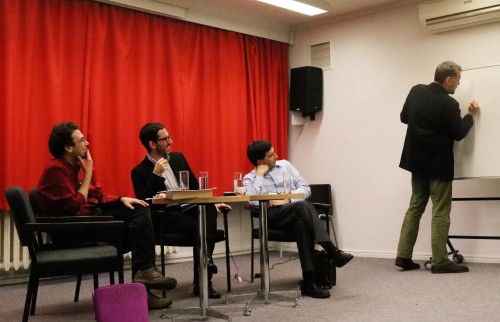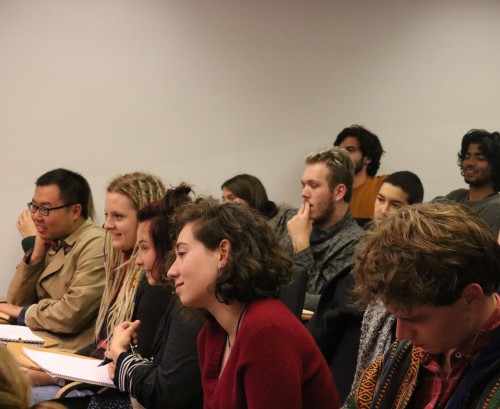
I am surprised that it took me this long to figure out just who exactly this “Plato” guy was. Growing up, I heard the names “Plato”, “Socrates”, and “Aristotle” often, usually in relation to one another, but did not understand what these names contributed to Western philosophy and science. Until recently, the mention of one of these three conjured up only imaginings of bearded faces and wise, earnest discourse in my mind. My knowledge went so far as to connect the names to Greek philosophy. Happily, my first semester of a liberal arts education has brought me further in my understanding.
For those who are likewise as confused as I was, let me quickly explain what I have gleaned. Socrates was a teacher to Plato and Plato a teacher to Aristotle. The Socratic way of teaching involved discourse. One theory I have heard attributed to Socrates went that only through discourse in which the parties involved stated their honest opinions could one get at the truth of a matter. I have encountered this theory put into practice in some of my high school English classes. It seems that it has become an educational philosophy upon itself. It goes by the name of the “Socratic method”: teachers ask questions of their students that require them to examine their own attitudes and beliefs. If taken seriously, I have found this method can be very effective. Unfortunately, what it entails for history is that Socrates didn’t write anything down. Plato tells us that he felt writing would inhibit the exchange of ideas and that people would become dependent on the written word as they would no longer have to remember what they had learned. We can thank Plato for much of what we know about Socrates. He is responsible for recording what are generally known as the “Early”, “Middle”, and “Later” dialogues, collectively known as “Socratic” dialogues for the eponymous main character of the majority of the writings.
But the questions about Plato’s philosophical dialogues remains: why did he write them, and why do we read them? These were the questions appropriately approached through dialogue on the evening of Thursday the 8th of October in the Lecture Hall. The discussion was open to all students, but was especially welcoming of the BA1 cohort as it would serve as a complement to the “Plato’s Republic and Its Interlocutors” core course in Greek Civilization all BCB students must undertake in their first year. In order to address these questions, the school welcomed Andy German of Ben Gurion University (Beersheba, Israel) and Stuart Patterson of Shimer College (Chicago, USA). We also looked at the questions in conversation with “Plato’s Seventh Letter”. It should be mentioned that there is still debate amongst the academic community as to whether the letter can be credited to Plato or not. The evening operated under the assumption that it could. Our very own professors David Hayes and Michael Weinman hosted the event.
Stuart Patterson introduced himself as coming from a school whose curriculum is focused on the reading and teaching of what have been deemed the “Great Books” of Western Culture, some of which come from the time of Classical Antiquity. He indirectly offered the audience a legitimate reason as to why perhaps many laymen today consider the dialogues to be “great” despite not understanding them fully: It is possible that they are considered “great” simply because a lot of people before us considered them to be so. In other words, the notion that some works are great may “artificially constrain” our conception of what great works are. His unspoken message was that we must think critically for ourselves. Critical thinking was referred to again later in the evening in the context of the role of philosophy in general.
This — what philosophy really is and what its role really is — is something I have personally been wondering about since I first heard the term who knows how many years ago. It doesn’t seem as if a straight answer to this question exists. The etymology of the word might provide a good starting point. The word comes, unsurprisingly, from the Greek. “Philo” is taken to mean “love”, and “sophia” to mean “wisdom”. Thus philosophy is born: “a love of wisdom”.
This doesn’t get us very far.
The Stanford Encyclopedia of Philosophy is more informative on the matter. (Side note: this wonderful resource was recently recommended to me. Reader, if you, too, have long been frustrated by the abstruse and purportedly esoteric nature of philosophy, click here to redirect to the SEP. While the articles contained there are certainly not a replacement for reading and discussing actual philosophical texts, they can certainly aid in a confused student’s understanding of said texts.) It tells us that Plato helped found what the common modern conception of philosophy is today: “a rigorous and systematic examination of ethical, political, metaphysical, and epistemological issues, armed with a distinctive method”.
It seems that, in Plato’s time, there existed two views on philosophy. As Michael Weinman outlined them, these two views were:
- that philosophy is essentially abstract nonsense perpetrated by someone with their “head in the sky”
- that it is “dangerous”
Andy German suggested that philosophy, according to Plato, wasn’t for everyone. Andy summarised from Plato’s works that philosophy is useless if the soul is not “akin” to the objects of philosophy. It can not teach one to think critically. What it can do is develop this ability if it already exists within someone’s soul.
This was said in the context of the discussion of “Plato’s Seventh Letter”. The letter is addressed to the relatives and friends of Dion, who was killed after he and Plato attempted to counsel the tyrant Dionysus of Syracuse, Sicily. Though it is primarily an account of his visitations there and his attempts to teach Dionysus about philosophy, the letter digresses to explore the possibility of writing true philosophy down and also to discuss the theory of forms.
At the beginning of the evening, Michael drew our attention to passage 341c of the letter, which, as Stuart summarised, is essentially Plato writing against the idea of writing, saying that “it is at best a weakness that one must gratify”. This is after Plato recounts how Dionysus has made his own sort of handbook on philosophy, purporting to be an expert on metaphysics after only one lesson with Plato! Plato seems appalled by this notion. He claims that Dionysus is an impostor because those who do know the truth about metaphysics know that this truth cannot be expressed through writing and would not attempt such a thing. In the letter, this leads into a discussion of knowledge, the essence of things, and the soul’s acquaintance with knowledge.
This was one of the most interesting topics of the night’s discussion for me. It gets back to the role of philosophy. Andy addressed the issue once more by saying that philosophy is “always too late”. It can’t change things about our lives. It can’t convert a tyrant. But it can teach you why it is good to be alive, and about knowledge.
The Seventh Letter is complex and obscure on this count. I will use Stuart’s explanation of Plato’s thoughts on the soul’s relationship with knowledge. He says that knowledge is present in the soul: “we have within us that which we must remember”. “Life is like an arc on a circle,” where the body dies, but the soul continues through the circle, “bring[ing] with it from life to life” all it knows. The process of recollection (or remembrance) is thus us reacquainting ourselves with that which we were already acquainted at some other point on the soul’s journey through this circle. This is also Plato’s explanation for how we know what questions to ask while we are learning. It is because we already have the knowledge inside of us.
Woah. Let’s pause. I realise that’s a lot to take in all at once. So far we have addressed Plato’s viewpoints on writing, knowledge, and the soul’s relationship with knowledge. But this hasn’t answered our original questions. Why did Plato write the “Socratic” dialogues, and why do we read them? Andy had some theories on why he wrote them. He said that, on the one hand, a dialogue can be considered a tool that mimics the way the soul tries to talk to itself. On the other hand, the dialogues could have also served as a sort of advertisement for what one would be doing in the academy where he taught.
Another theory for why he wrote these dialogues can be analysed in relation to Plato’s Republic. BCB students enrolled in the Plato course or those who have already completed it will understand what I mean when I say the book raises more questions than it answers, and that it necessitates discussion. In Andy German’s words, it “fails utterly as a book” because you cannot read it alone. It ends insofar as it is open-ended. You need to discuss it with other people!
It seems that, among other reasons, Plato must have written his dialogues in the interest of the (re)acquisition of knowledge, and that we read and discuss them in the same interest. As Michael concluded the evening, Plato must have believed that the corpus (relating to the fact that it is a body of writing) through which knowledge is transmitted is not of primary importance. What matters is the flame itself that leaps from soul to soul.
“[A]fter much converse about the matter itself and a life lived together, suddenly a light, as it were, is kindled in one soul by a flame that leaps to it from another, and thereafter sustains itself” (341c, 341d).
[hupso_hide]

